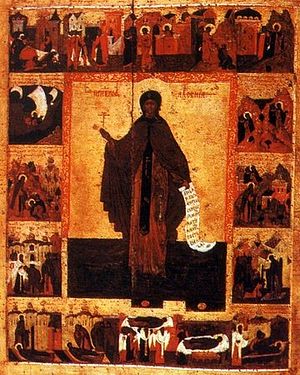Saint Xenia of Rome, in the world Eusebia, was the only daughter of an eminent Roman senator. From her youth she loved God, and wished to avoid the marriage arranged for her. She secretly left her parental home with two servants devoted to her, and set sail upon a ship. Through the Providence of God she met the head of the monastery of the holy Apostle Andrew in Milassa, a town of Caria (Asia Minor). She besought him to take her and her companions to Milassa. She also changed her name, calling herself Xenia [which means “stranger” or foreigner” in Greek].
At Milassa she bought land, built a church dedicated to Saint Stephen, and founded a woman’s monastery. Soon after this, Bishop Paul of Milassa made Xenia a deaconess, because of her virtuous life. The saint helped everyone: for the destitute, she was a benefactress; for the grief-stricken, a comforter; for sinners, a guide to repentance. She possessed a deep humility, accounting herself the worst and most sinful of all.
In her ascetic deeds she was guided by the counsels of the Palestinian ascetic, Saint Euthymius. The sublime life of Saint Xenia drew many souls to Christ. The holy virgin died in 450 while she was praying. During her funeral, a luminous wreath of stars surrounding a radiant cross appeared over the monastery in the heavens. This sign accompanied the body of the saint when it was carried into the city, and remained until the saint’s burial. Many of the sick received healing after touching the relics of the saint.
Troparion — Tone 3
Living the life of a stranger in the world, / you estranged yourself from every sin; / you abandoned comforts and fleeting honors / and betrothed yourself to your Immortal Bridegroom. / Glorious Xenia, entreat Christ our God to grant us His great mercy.
Kontakion — Tone 2
We celebrate the memory of the life you lived as a stranger in the world, / and as we honor you with love, O Xenia, / we praise Christ, who gave you power to grant healing to all; / ever pray to Him on our behalf.

